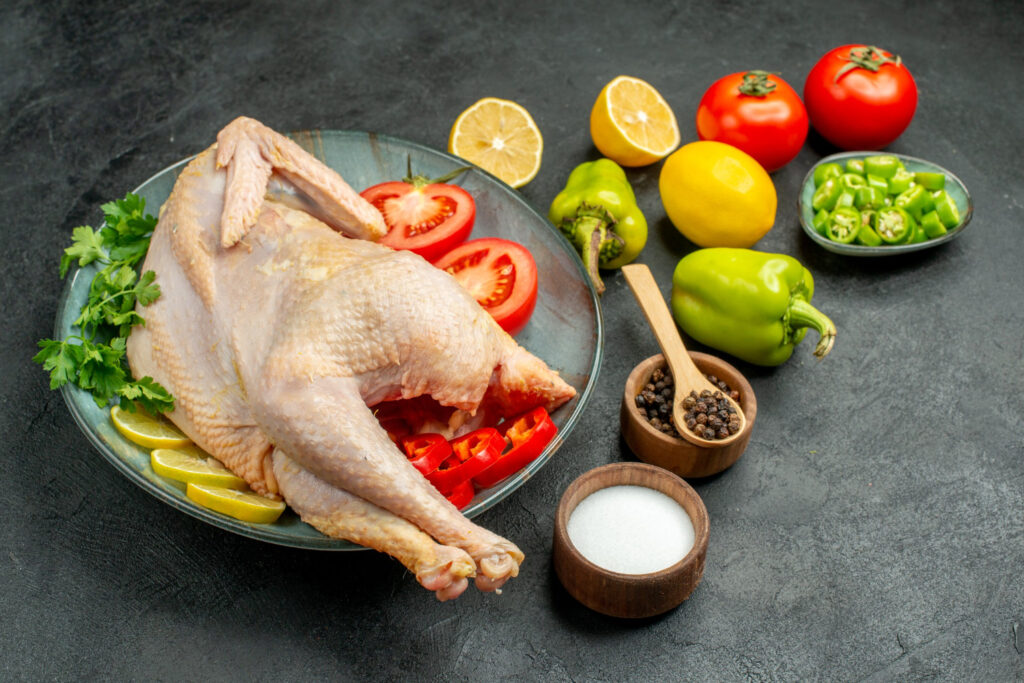
In this article
Chicken meat is incredibly nutritious and is one of the most popular protein sources worldwide. When included in a balanced diet, chicken can improve muscle mass and support weight maintenance, among other health benefits.
Source of Complete Protein
Chicken is an excellent source of complete protein, which means it provides all nine essential amino acids that the body cannot produce on its own. These amino acids, along with protein, are the building blocks of life and are essential for numerous bodily functions, including blood clotting, vision, immune response, fluid balance, growth, and development, and the production of hormones, antibodies, and enzymes.
The amount of protein in chicken varies by cut. For example, a 3-ounce serving of chicken breast supplies 26 grams of protein, while the same portion of wings, thighs, and drumsticks provides around 20 grams. While other meat and animal products are also complete protein sources, white meat like chicken is often considered a healthier alternative to red and processed meats, which have been linked to increased risks of heart disease, dementia, and cancer. In contrast, white meat is generally seen as neutral or potentially protective against these conditions.
Supports Muscle Growth and Maintenance
Dietary protein provides the body with the amino acids needed to repair and build muscle tissue. When combined with resistance training, higher protein intakes have been shown to increase muscle mass and strength. Additionally, higher protein intake can help preserve muscle mass during periods of calorie restriction and weight loss. Protein is not only beneficial for those looking to increase muscle mass but is also crucial for healthy aging. Inadequate protein intake can lead to muscle loss, impaired muscle growth, and functional decline in older adults.
May Promote Weight Loss
Chicken, particularly skinless chicken breast, is high in protein yet low in calories. Observational studies have indicated that when consumed as part of a vegetable-rich diet, chicken may help reduce the risk of obesity. This is likely due to its high protein content, which has a higher thermic effect than carbohydrates or fat, meaning the body burns more calories digesting and metabolizing protein. Protein also helps maintain lean muscle mass, preventing a dip in metabolism during weight loss. Several studies have found that high-protein diets can improve weight loss and help prevent weight regain, although long-term studies are needed to determine if these effects last beyond 12 months.
May Improve Brain Development and Function
Chicken is a rich source of choline and vitamin B12, both of which play crucial roles in brain development and function. It is estimated that 90%–95% of pregnant individuals do not meet their daily choline needs. While research is limited and sometimes conflicting, low choline levels during pregnancy may be linked to neural tube defects. Conversely, higher choline intake during pregnancy is associated with cognitive benefits in babies. Additionally, a higher intake of choline may protect against cognitive decline in older adults. Adequate vitamin B12 intake is also essential for brain health. Infants born to individuals with inadequate vitamin B12 levels are at greater risk of poor growth, impaired psychomotor function, and brain development issues that may not be reversible.
May Improve Skin and Joint Health
Chicken is an excellent source of dietary collagen. Many collagen supplements are made by extracting collagen from chicken bones, skin, and feet. Collagen is the main structural protein found in bones, skin, and tendons. As we age, our bodies produce less collagen, leading to joint pain, muscle weakness, and wrinkles. Research has shown that chicken collagen may help improve joint pain and stiffness. Animal studies suggest that collagen from chickens may also help prevent skin aging, though more research on humans is needed to confirm this effect. To reap the potential benefits of chicken collagen, consume cuts with the skin on or make collagen-rich bone broth by simmering leftover skin and bones from a whole chicken.
Nutrition of Chicken
The nutrition of chicken can vary depending on the cut, the cooking method used, and whether or not it has the skin on.
- Boneless, Skinless, Cooked Chicken Breast (3 ounces):
- Calories: 128
- Fat: 2.7 g
- Saturated Fat: 0.8 g
- Unsaturated Fat: 1.7 g
- Sodium: 44 mg
- Carbohydrates: 0 g
- Fiber: 0 g
- Protein: 26 g
- Phosphorus: 18% of the daily value (DV)
- Selenium: 44% of the DV
- Choline: 20% of the DV
- Riboflavin (vitamin B2): 14% of the DV
- Niacin (vitamin B3): 64% of the DV
- Pantothenic acid (vitamin B5): 29% of the DV
- Vitamin B6: 58% of the DV
- Vitamin B12: 7% of the DV
- Skin-on Chicken Thigh (3 ounces):
- Calories: 197
- Fat: 12.5 g
- Saturated Fat: 3.5 g
- Unsaturated Fat: 7.9 g
- Sodium: 87 mg
- Carbohydrates: 0 g
- Fiber: 0 g
- Protein: 20 g
- Phosphorus: 15% of the DV
- Zinc: 13% of the DV
- Selenium: 39% of the DV
- Choline: 12% of the DV
- Riboflavin (vitamin B2): 12% of the DV
- Niacin (vitamin B3): 31% of the DV
- Pantothenic acid (vitamin B5): 21% of the DV
- Vitamin B6: 21% of the DV
- Vitamin B12: 16% of the DV
Dark meat chicken, like chicken thighs, contains more fat and slightly more calories than white meat, like chicken breast. Most of the fat in chicken thighs is unsaturated fat, which can have heart health benefits when consumed in moderation. However, thigh cuts with the skin on are relatively high in saturated fat, which can increase cholesterol levels and heart disease risk. Despite this, both dark and white meat are packed with nutrients like protein, several B vitamins, and selenium. B vitamins help convert food into energy and are important for red blood cell production. Selenium has antioxidant properties, protecting against cell damage and supporting immune system and thyroid gland function.
Risks of Chicken

- Dietary Restrictions: Chicken is not suitable for vegans or vegetarians.
- Kidney Disease: People with kidney disease who are not on dialysis may need to limit their chicken intake due to its high protein content, which can stress the kidneys.
- Food Safety: Raw chicken is often contaminated with harmful bacteria. Safe food handling practices and cooking chicken to an internal temperature of at least 165 degrees Fahrenheit are essential to avoid food poisoning.
- Allergies: Some individuals may be allergic to chicken. If allergic to other meats, such as beef or turkey, it’s possible to be allergic to chicken as well. Symptoms include nausea, vomiting, hives, or difficulty breathing after consuming chicken.
Tips for Consuming Chicken
- Opt for healthier cooking methods like baking, grilling, or pan-frying with olive oil instead of frying.
- Consume skin-on chicken in moderation to avoid excessive saturated fat intake.
- Incorporate chicken into salads, stir-fries, and use ground chicken as a substitute for beef in various dishes.
- Avoid processed chicken products, which are often high in sodium and preservatives.
In summary, chicken is a versatile and nutritious protein source beneficial when included in a balanced diet. However, it is important to be mindful of preparation methods and potential dietary restrictions to maximize its health benefits











